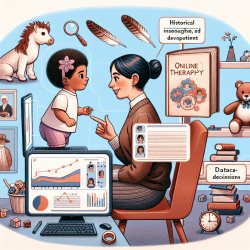Introduction
The COVID-19 pandemic has served as an unprecedented stress test for educational systems worldwide. The research article, "The COVID-19 Pandemic as Educational Stress Test: What Are the Results?" explores how the pandemic has exposed vulnerabilities and deficiencies in educational practices, particularly in the field of psychiatry. As practitioners in speech-language pathology, we can draw valuable lessons from these findings to enhance our own practices and improve outcomes for children.
Understanding Burnout and Its Implications
One of the key themes highlighted in the research is the issue of burnout among trainees and early-career professionals. The pandemic has exacerbated stress levels, leading to increased emotional exhaustion and decreased personal accomplishment. For speech-language pathologists, understanding the signs of burnout and implementing strategies to mitigate its effects is crucial. This can include providing mental health support, promoting work-life balance, and ensuring manageable workloads.
The Importance of Mentoring
The research underscores the significance of mentoring, especially during times of crisis. Mentoring provides a supportive framework for trainees to develop confidence in their abilities. In speech-language pathology, fostering strong mentoring relationships can help practitioners navigate the challenges posed by the pandemic and beyond. Mentors can offer guidance, share experiences, and provide encouragement, ultimately contributing to the professional growth of their mentees.
Embracing Flexibility in Training
Flexibility in training and professional life is another critical aspect highlighted in the research. The pandemic has magnified existing inequities, particularly for women in academic medicine. By embracing flexible training models and career paths, speech-language pathology programs can accommodate diverse needs and promote inclusivity. This can involve offering flexible hours, remote learning options, and opportunities for career breaks without penalizing trainees.
Preparing for Future Public Health Crises
The research emphasizes the need for educational preparation to address future public health crises. Teletherapy and online learning have become essential tools during the pandemic, and their integration into speech-language pathology education is vital. Practitioners should be equipped with the skills to deliver high-quality teletherapy services and adapt to changing circumstances. This includes staying updated on technological advancements and ensuring consistent quality across virtual platforms.
Encouraging Further Research
While the research provides valuable insights, it also highlights the need for further exploration. Speech-language pathologists can contribute to this body of knowledge by conducting studies on the impact of the pandemic on therapy outcomes, the effectiveness of teletherapy, and strategies to prevent burnout. By engaging in research, practitioners can drive evidence-based practices and continuously improve the quality of care provided to children.
Conclusion
The COVID-19 pandemic has served as a wake-up call for educational systems, revealing areas that require attention and improvement. By learning from the experiences of other fields, such as psychiatry, speech-language pathologists can enhance their practices and create better outcomes for children. Emphasizing mental health support, fostering mentoring relationships, embracing flexibility, and preparing for future crises are essential steps in this journey. To read the original research paper, please follow this link: The COVID-19 Pandemic as Educational Stress Test: What Are the Results?










